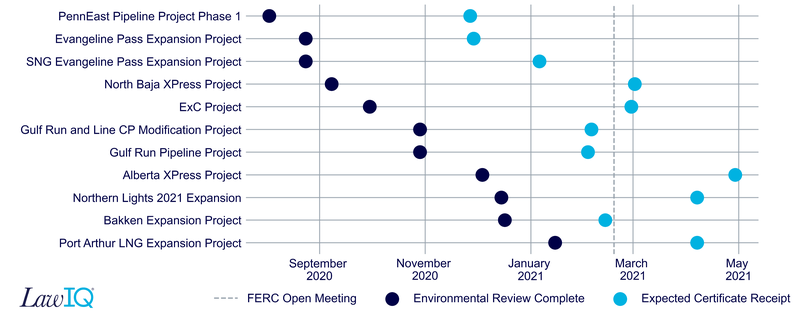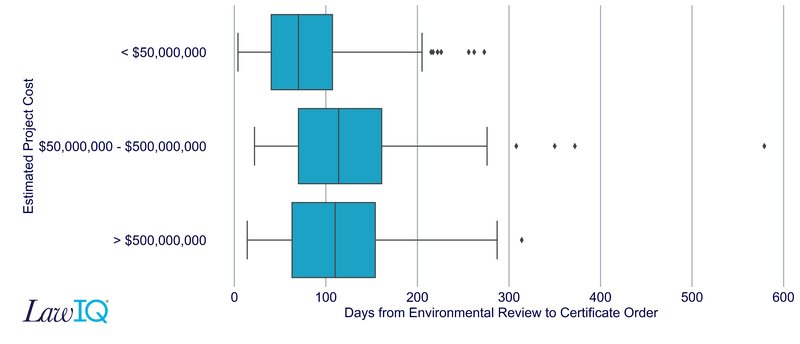What’s the issue?
In a very revealing appellate brief filed earlier this week, the FERC’s Office of the General Counsel declined to defend three separate FERC orders issued for Mountain Valley Pipeline (MVP).
Why does it matter?
The Office of the General Counsel took this unprecedented step of refusing to defend its client’s (FERC) orders because the Commission “may, if a majority is obtained, address the issue at a future date.” This is clearly a problem for MVP, but may also be a problem for other pipelines with pending litigation. In addition, there are a number of pipeline cases pending at FERC that may be stuck until Chairman Glick can “obtain” a working majority to approve any projects.
What’s our view?
There are disconcerting signs being sent by Chairman Glick, Commissioner Clements and even the newest Republican, Commissioner Christie, that could lead to reversals of FERC positions on previously approved projects, substantial delays in pending projects and untold schedule and even viability risk for any future projects until we know exactly where all three of these members stand.
In the musical Hamilton, Aaron Burr gives Alexander Hamilton some early advice: “Don’t let them know what you’re against or what you’re for.” As we discussed in the past, including in The First Casualty of FERC’s Fight Over GHG, we know what Chairman Glick is against -- which is every pipeline expansion and LNG project that has been voted on since the middle of 2019. But what we stated then still holds true: his “affirmative positions remain a mystery.”
We hoped that with his elevation to the chairmanship of FERC that we would find out what it would take for a pipeline or LNG project to gain his approval, but there has been little evidence of that yet. While Commissioner Chatterjee has indicated in the past that he had forged an agreement with Chairman Glick on how they would work together to approve pipeline projects in the future, the problem may be in finding a third vote among the remaining members.
Today we discuss some troubling developments for projects that were previously approved over Chairman Glick’s dissents and why the publicly expressed views of the two newest members could be leading to a very long pause in FERC approvals while the current five members determine whether there is any common ground on which they can approve pending and future cases.
Approved Projects With Appeals Pending May be at Risk
Earlier this week, the FERC’s Office of the General Counsel took a very surprising and troubling position in a case pending before the U.S. Court of Appeals for the District of Columbia Circuit (DC Circuit). In that case, various opponents of the Mountain Valley Pipeline (MVP) project asked the DC Circuit to stay three FERC orders that allow continued construction of that project. Chairman Glick dissented in all three orders, which is his right, but the unprecedented development is that the Office of the General Counsel refused to defend the actions of its client, FERC, and, even more surprisingly, said it would not do so because the “Commission — with a new Chairman and two new Commissioners added to the agency since issuance of the construction orders — may, if a majority is obtained, address the issue at a future date.” (Emphasis added.)
A lawyer representing a client like an agency is supposed to zealously represent the entity and not any individual in that entity, like the chairman. Yet, here, FERC’s Office of the General Counsel has refused to defend those orders, not because FERC, “acting through its duly authorized constituents” has modified those decisions, but only because it “may, if a majority is obtained.” This stance appears to create a new risk for any project that has an order under appeal and in which Chairman Glick dissented, because it appears that the Office of the General Counsel has decided it will no longer defend those decisions, even when they remain the only legally effective action of the Commission.
By the time you read this, we may know how widespread this problem may be and also how the courts may react to FERC’s refusal to defend its orders because there was an oral argument earlier today in a case involving an order in Tennessee Gas’s 261 Upgrade Project. Similarly, the briefing is complete with regard to the Spire STL pipeline, and oral argument is scheduled for early March. In addition, there are two other projects that still have active challenges pending before courts that could be impacted by this decision, Algonquin’s Atlantic Bridge project and the Jordan Cove LNG project. The notice for next week’s open meeting includes a new subdocket for the Atlantic Bridge proceeding, so we could get some indication of the Commission’s direction in that case next week. In both of those appeals, FERC is supposed to file briefs in April. The orders under review in all of these cases were ones in which Chairman Glick dissented.
Pending Projects May be Facing Substantial Delays
The problem that Chairman Glick may be facing is that, while he knows what he and Commissioner Chatterjee would require to approve a pipeline or LNG project, he may not currently have a working majority that agrees. There are a number of projects currently pending at FERC that have completed their environmental review and are awaiting a certificate.

If Chairman Glick had a clear path forward and a working majority to support it, we would have expected that a number of these projects would have received data requests by now asking them for the additional data FERC needs to fully assess the project in a manner consistent with the standards Chairman Glick will require. However, to date, there have been no such data requests. This leads us to believe that these projects may be stuck in limbo for a while as Chairman Glick determines just what data he will need to meet his requirements and those of a working majority. Next week’s open meeting agenda also lists the proceeding launched over two years ago by Chairman McIntyre to review FERC’s certificate policy statement, but we believe all that will occur is that FERC will request refreshed comments on that policy.
Pending and Future Projects May Face a Longer and Slower Process
Since taking their positions at FERC, Commissioners Clements and Christie have made a number of statements concerning their views about FERC’s certificate process. Commissioner Clements has stated that FERC’s certificate process is “broken” and that, at a minimum, the Commission needs to start analyzing greenhouse gas impacts as required by the DC Circuit in its Sabal Trail decision. Exactly what she thinks that level is and what more she wants is unclear. She has also stated that FERC’s Certificate Policy Statement needs to be completely revamped for the current environment and has expressed a keen desire that FERC establish and fully staff an Office of Public Participation to improve access to Commission business for non-expert individuals who may be affected by its decisions. It is her belief that a more robust process will aid project sponsors because they will no longer suffer delays from having the certificate appealed and overturned. However, anyone who has followed projects knows that projects have not been delayed because of challenges to the FERC certificate. It is the other permits, over which FERC lacks authority, that have led to the delays of construction, especially on MVP, which is the example she cites as evidence that the process is broken.
As for Commissioner Christie, he has also suggested that a more robust process may be required and should benefit project proponents. He cites his experience at the Virginia State Corporation Commission (SCC) in its siting of highly controversial transmission lines. He suggests that the use of an adjudicatory process before a hearing officer leads to a more defensible result, and one that has buy-in from all stakeholders. A review of the last five years of such cases does show that none of them were appealed, which may be why he thinks that process leads to a more defensible decision. But as noted above, it has not been the FERC certificate appeals that have delayed projects. In looking at the process before the Virginia SCC, it does look like that process is fairly efficient.

As seen above, the median time period from the commencement of the proceeding to the order is less than one year. However, we would expect adopting such a process for all FERC matters would lead to a much longer process. FERC has three tracks used for its hearings before administrative law judges; the shortest track calls for a decision within 30 weeks after the judge is appointed, and the two longer tracks allow for 47 and 63 weeks following the judge’s appointment. If you assume that this process would not commence until FERC staff issues its environmental report for a project, which is often the main aspect of the project subject to complaint, then adding such a process to the current timeline would lead to a substantial extension of that timeline.

As seen above, if you assume the smaller projects would follow the quickest of FERC’s three timetables, a 30-week process would add about twenty weeks to the overall timeline. The additional time needed under the longer tracks would add even more time to the medium and larger projects.
We will continue to monitor developments at FERC, which may make clear what the conditions will be for a working majority to approve pipeline expansion projects.


